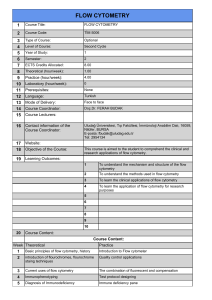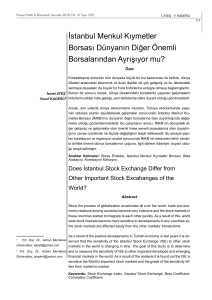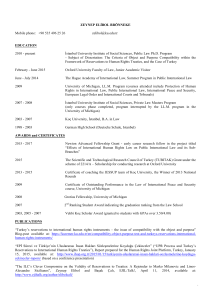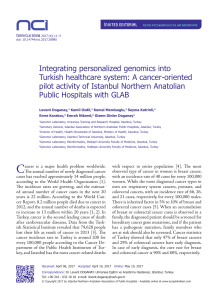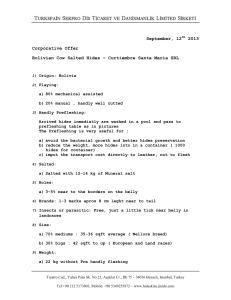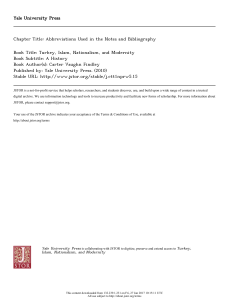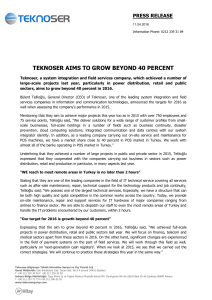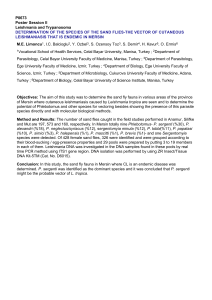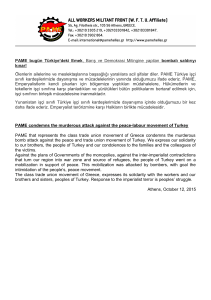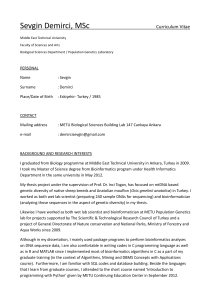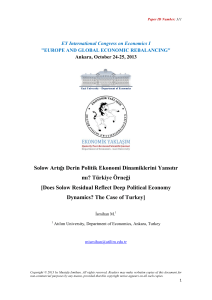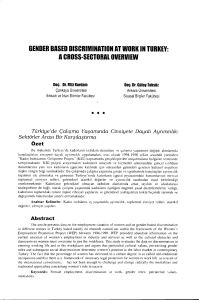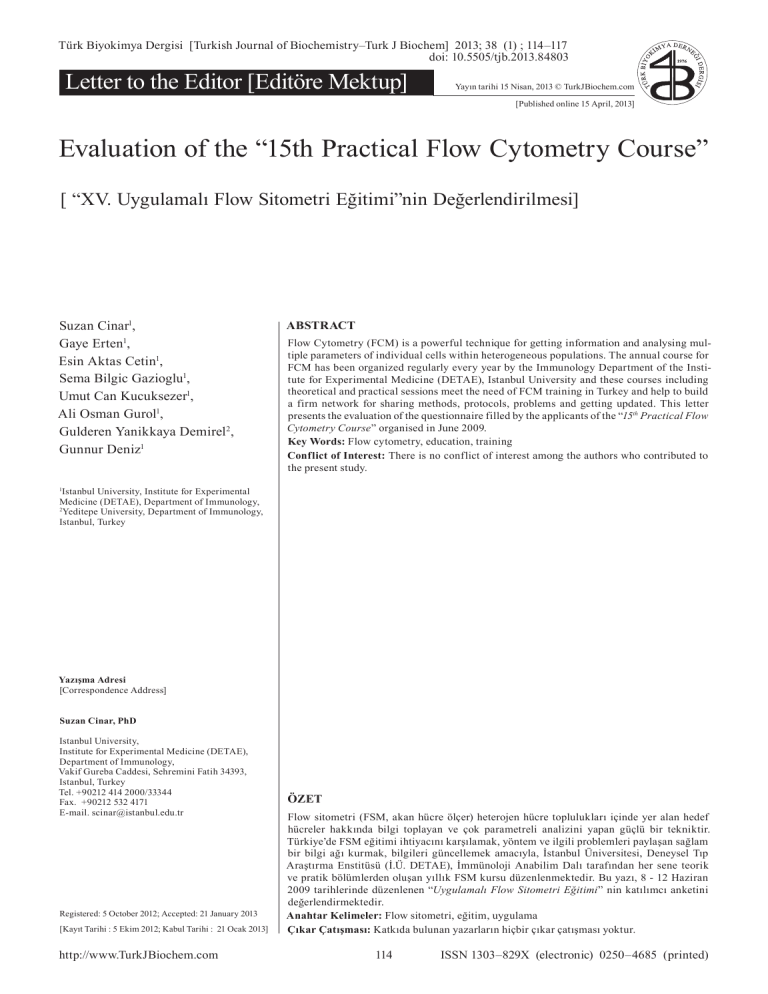
ORJİNAL
Türk Biyokimya Dergisi [Turkish Journal of Biochemistry–Turk J Biochem] 2013; 38 (1) ; 114–117
doi: 10.5505/tjb.2013.84803
Letter to the Editor [Editöre Mektup]
Yayın tarihi 15 Nisan, 2013 © TurkJBiochem.com
[Published online 15 April, 2013]
1976
DER
AD
RNN
MYYA
İM
EE
Kİ
1976
K BİİYYO
RRK
O
TTÜÜ
RK BİYO
TÜ
YA DERN
İM
E
DERGİSİ
Ğİ
K
RG
GİİSSİ
ER
DE
D
İ
Ğİİ
Ğ
Evaluation of the “15th Practical Flow Cytometry Course”
[ “XV. Uygulamalı Flow Sitometri Eğitimi”nin Değerlendirilmesi]
1. ÖRNEK
Suzan Cinar1,
Gaye Erten1,
Esin Aktas Cetin1,
Sema Bilgic Gazioglu1,
Umut Can Kucuksezer1,
Ali Osman Gurol1,
Gulderen Yanikkaya Demirel2,
Gunnur Deniz1
ABSTRACT
Flow Cytometry (FCM) is a powerful technique for getting information and analysing multiple parameters of individual cells within heterogeneous populations. The annual course for
FCM has been organized regularly every year by the Immunology Department of the Institute for Experimental Medicine (DETAE), Istanbul University and these courses including
theoretical and practical sessions meet the need of FCM training in Turkey and help to build
a firm network for sharing methods, protocols, problems and getting updated. This letter
presents the evaluation of the questionnaire filled by the applicants of the “15th Practical Flow
Cytometry Course” organised in June 2009.
Key Words: Flow cytometry, education, training
Conflict of Interest: There is no conflict of interest among the authors who contributed to
the present study.
Istanbul University, Institute for Experimental
Medicine (DETAE), Department of Immunology,
2
Yeditepe University, Department of Immunology,
Istanbul, Turkey
1
Yazışma Adresi
[Correspondence Address]
Suzan Cinar, PhD
Istanbul University,
Institute for Experimental Medicine (DETAE),
Department of Immunology,
Vakif Gureba Caddesi, Sehremini Fatih 34393,
Istanbul, Turkey
Tel. +90212 414 2000/33344
Fax. +90212 532 4171
E-mail. [email protected]
Registered: 5 October 2012; Accepted: 21 January 2013
[Kayıt Tarihi : 5 Ekim 2012; Kabul Tarihi : 21 Ocak 2013]
http://www.TurkJBiochem.com
ÖZET
Flow sitometri (FSM, akan hücre ölçer) heterojen hücre toplulukları içinde yer alan hedef
hücreler hakkında bilgi toplayan ve çok parametreli analizini yapan güçlü bir tekniktir.
Türkiye’de FSM eğitimi ihtiyacını karşılamak, yöntem ve ilgili problemleri paylaşan sağlam
bir bilgi ağı kurmak, bilgileri güncellemek amacıyla, İstanbul Üniversitesi, Deneysel Tıp
Araştırma Enstitüsü (İ.Ü. DETAE), İmmünoloji Anabilim Dalı tarafından her sene teorik
ve pratik bölümlerden oluşan yıllık FSM kursu düzenlenmektedir. Bu yazı, 8 - 12 Haziran
2009 tarihlerinde düzenlenen “Uygulamalı Flow Sitometri Eğitimi” nin katılımcı anketini
değerlendirmektedir.
Anahtar Kelimeler: Flow sitometri, eğitim, uygulama
Çıkar Çatışması: Katkıda bulunan yazarların hiçbir çıkar çatışması yoktur.
114
ISSN 1303–829X (electronic) 0250–4685 (printed)
2. ÖRNEK
Current FCM systems are unique tools supported by
technologic developments intensely. FCM performs the
analysis of thousands of cells in a second by up to nine
fluorescences and by two parameters (size and granularity), providing scientists to gather statistical data on
large number of cells. This ability makes it possible to
study oncogenesis, apoptosis or cell cycle of cell populations and cellular events like DNA content [1]. FCM
can be used for immunophenotyping and distinguishing
between healthy and diseased cells, is used to assist diagnosis and monitor myelomas, lymphomas, leukemias, immunodeficiencies [1, 2, 3]. FCM is widely used in
other fields like veterinary medicine, microbiology and
fisheries. In both routine and research applications, data
analysis, interpretation and reporting processes requires
well educated users which is the core important issue for
accurate results [2]. Immunology Department organised “Flow Cytometry and its use in Medicine” meeting
as a one day organisation in 1995, to satisfy the need
and to update the knowledge and awareness. The meeting was organised for three days in following years, and
transformed to a five day meeting in 2003. The course
includes theoretical and practical sessions. Practical sessions are usually held as wet labs, there are few tutorials
included in practical sessions.
Course
“15th Practical Flow Cytometry Course” was held in
DETAE on June 8 - 12, 2009, and 20 expert scientists
gave theoretical lectures. Two FCMs, FACSCalibur and
FACSAria cell sorter (Becton Dickinson, USA) in the
department’s facility were used in wet labs. The practical
sessions included seven main topics: immunophenotyping, CD34 measurement, DNA analysis, intracellular
phosphokinase analysis, interpretation of the data in
childhood/adult leukemias and sorting. Technical specifications of FCM and study methods on cells like natural
killer (NK) cells, stem cells and circulating endothelial
cells were discussed, quality control and standardization, DNA analysis and cell cycle, immunophenotyping,
apoptosis, intracellular cytokines, proliferation and cell
functions in transplantation and their protocols were
addressed. One day was specifically designated for hematological diseases, and on the last day additional applications were discussed. Immunophenotyping, bcl-abl
determination, DNA analysis, leukemia diagnosis and
sorting studies were performed in wet lab sections.
Questionnaire
On the evaluation session applicants were asked to fill in
questionnaire forms and participant’s demographic information, background of flow cytometry, their expectations, critics and appreciations were evaluated.
Twenty six (90%, female/male: 17/9) of 29 participants
participated in the survey. The attendants were mainly
from Istanbul (9, 34.6%) followed by Antalya (3, 11%),
Turk J Biochem, 2013; 38 (1) ; 114–117.
Isparta, Manisa, Kayseri (2, 7.7%, Figure 1A). Participants were mostly medical doctors (31%) and biologists
(31%) followed by academicians (8%), laboratory technicians (7%) and other professions (Figure 1B). Most of
the participants were working at universities (17, 65%),
private hospitals or laboratories (4, 15%), and state hospitals (4, 15%, Figure 1C). Participants from universities
were working mainly (80%) on basic sciences in medical faculties (Table 1, Figure 1D). The majority of the
researchers were microbiologists and biochemists. Nine
participants (35%) were active users performing routine
immunophenotyping (8, 89%; Table 2), while thirteen
(50%) had FCM in their department. Five attendants
(19%) had previous trainings. The attendants’ expectations were divided in four categories: 27% expected to learn FCM basically, 42% theoretically but not practically,
38% basically and practically and 19% expected using
FCM individually. Making more than one choices, 38%
scored the course “very beneficial”, 50% “beneficial”,
12% “not beneficial” and 4% “contextually insufficient”.
15% claimed to have learned FCM basically, 58% basically, but not practically, 23% noted the course to be sufficient theoretically and practically, and 4% to be able to
use FCM individually in their studies. The participants
emphasized the complexity of FCM and the insufficiency of the practical applications and underlined the
necessity of gaining experience in using FCM, having
different brand and models of FCMs in their own lab,
and they declared applications to be done intensively in
smaller groups. Most of the participants suggested using
different brand FCMs, organizing two different courses
for beginners and FCM users, and allowing the students
to perform individually on FCM.
Flow cytometry education in Turkey
FCM education may be organized in different forms:
lectures & courses; in service, online or continuous
workshops. Service training is the most used strategy for
clinical applications, but although many major methods
and protocols are mostly given in courses and lectures,
it might be insufficient in some cases of lymphoma and
leukemia immunophenotyping [2]. FCM training in
Turkey is usually given by company tutorials or local
technical services or in company education centers. In
the latter, language is a common communication barrier.
The main advantage of this course was that all lectures
and applications were performed by local experts in Turkish. The trainers also published “Flow Cytometry and
Medical Applications”, a book summarizing methods
and protocols [4, 5].
The course trainers with at least ten years experience on
FCM fulfilled the criteria by Greig et al. suggesting the
education to be given by experts with at least two years
experience [2]. According the questionnaire, thirteen
applicants (50%) were coming from FCM laboratories
and nine (89%) were active FCM users. Five of the attendants had already joined previous DETAE courses.
115
Cinar et al.
Table 2. Tests performed by the attendants active FCM users (n=9)
TEST
N
%
Immunophenotyping (lymphocyte
subgroups)
8/9
89
3/9
33
Platelet analysis
3/9
33
Cross match
3/9
33
Leukemia lymphoma panels
2/9
22
PNH (diagnosis)
2/9
22
CD3 (organ transplantation)
1/9
11
HLA B27
1/9
11
Viability
1/9
11
Project scope
1/9
11
CD4 and CD8
(rat or HIV patients)
Based on the feedback, it is clear that these courses are
an update for FCM users and basic knowledge for beginners. Getting current information in their own language
leads to an interactive training compared to advanced
workshops organized biennially in Turkey by the Turkish Society of Immunology, with contribution of American colleagues and societies like International Society
for Advancement of Cytometry and International Clinical Cytometry Society, to help Turkish users for getting
first hand information from pioneers of cytometry.
In conclusion, our annual course organized regularly for
the last fifteen years, meets the need of FCM training in
Turkey and helps to build a firm network among FCM
users. The third edition of the book published in 2009
[1], is an important reference book to keep up with new
instrumentation technologies and diversify applications
in laboratories. We aim to continue these courses on regular basis, to improve the level of knowledge for cytometry in Turkey.
Information and acknowledgment
The research is based on a poster presentation at “20th
National Immunology Congress” and “CYTO2010”.
Conflict of Interest: There is no conflict of interest
among the authors who contributed to the present study.
Figure 1. Distribution of the participants regarding to: A cities, B professions, C affiliations (TÜBİTAK; The Scientific and Technological
Research Council of Turkey), D Faculty distribution of the attendants from universities
Turk J Biochem, 2013; 38 (1) ; 114–117.
116
Cinar et al.
Table 1. Affiliations of the attendants from medical faculty
DEPARTMENT
N
%
Biochemistry
3
25%
Microbiology
3
25%
Immunology
2
17%
Hematology
2
17%
Tissue Typing
1
8%
Genetics
1
8%
Total
12
Pediatric allergy
1
33%
Cardiology
1
33%
Infectious Diseases
1
33%
Total
3
Basic Sciences
80%
Internal Medicine
20%
References
[1] Erten G, Yanıkkaya Demirel G, Deniz G. Akan Hücre Ölçer ve
Uygulama Alanları 2009;pp.1-176, Medya Tower, İstanbul.
[2] Greig B, Oldaker T, Warzynski M, Wood B. 2006 Bethesda
International Consensus recommendations on the immunophenotypic analysis of hematolymphoid neoplasia by flow cytometry: recommendations for training and education to perform
clinical flow cytometry. Cytometry B Clin Cytom 2007; 72
Suppl 1: S23-33.
[3] O’Gorman MRG and Scholl PR. Role of flow cytometry in the
diagnostic evaluation of primary immunodeficiency disease.
Clin Applied Immunol Rev 2002; 2(6):321-335.
[4] Yılmaz MT, Deniz G. Flow Sitometri ve Tıpta Kullanımı
1999;pp.1-106, Bilmedya Grup, İstanbul.
[5] Deniz G, Yılmaz MT, Yıllar G. Flow Sitometri ve Tıpta Kullanımı 2004;pp.1-192, 2. ed, Bilmedya Grup, İstanbul.
Turk J Biochem, 2013; 38 (1) ; 114–117.
117
Cinar et al.

